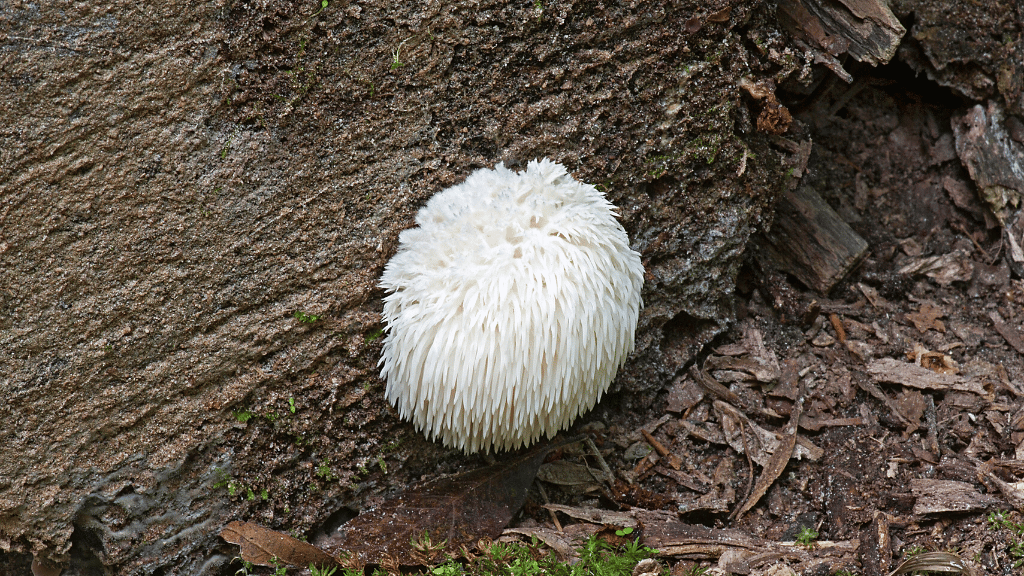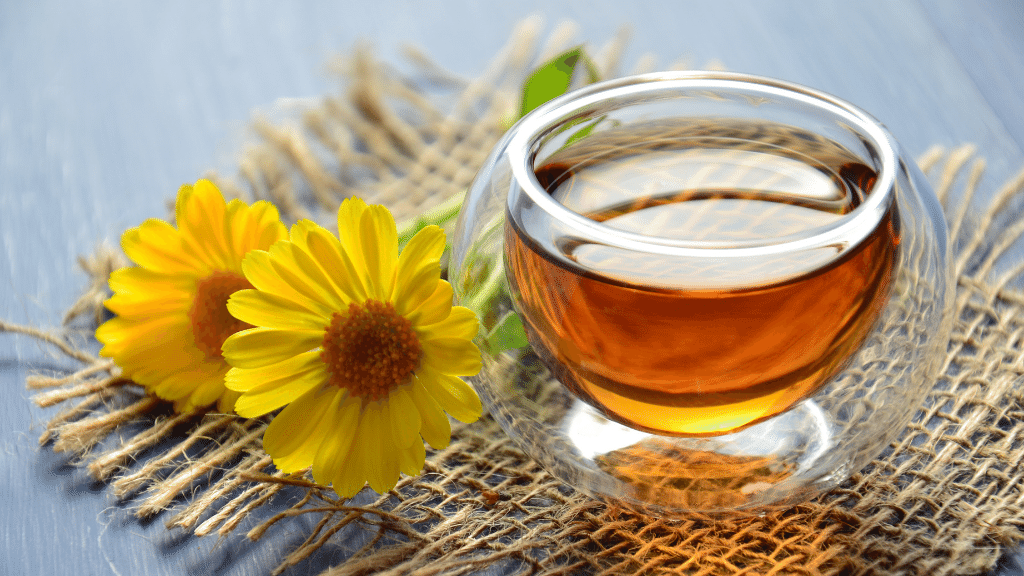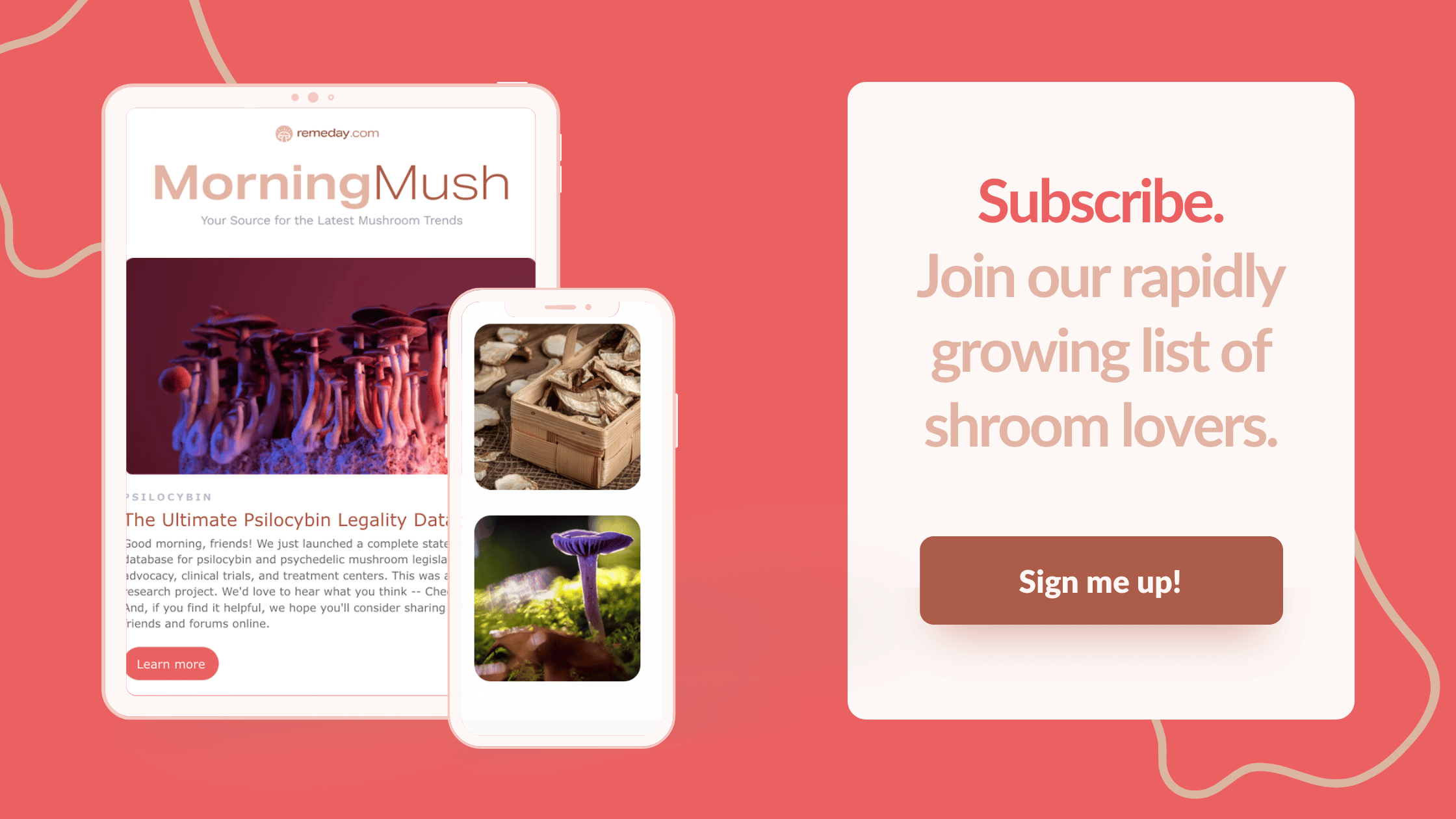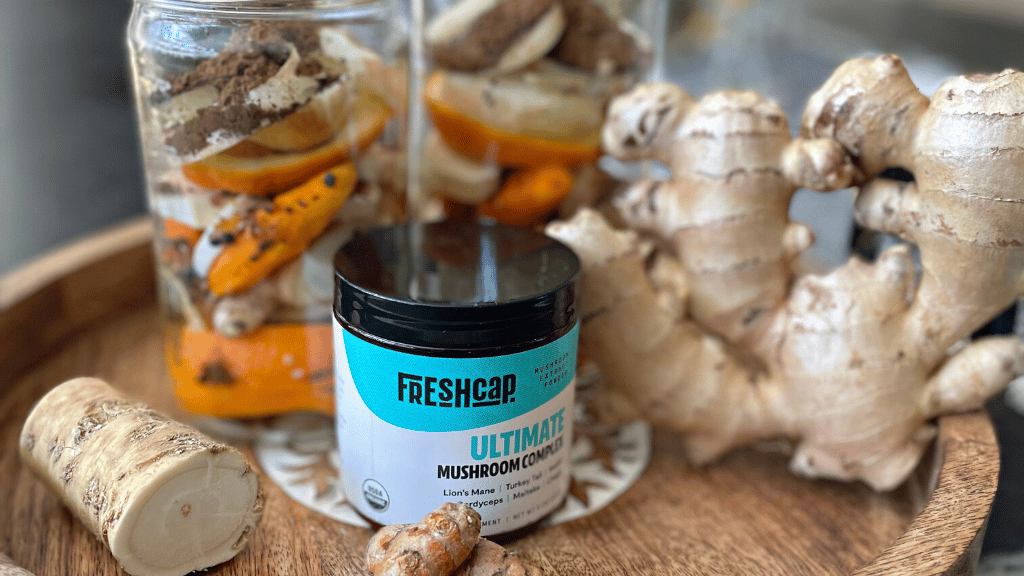In today's world, the pursuit of alternative and complementary treatments for various health conditions has gained significant attention. Here at Remeday, we are dedicated to exploring the functional and medicinal benefits of mushrooms. But only as far as the science takes us.
If you're wondering whether lion's mane is a safe and effective supportive treatment for ADHD, you've come to the right place. We'll help you understand the scientific evidence and anecdotal evidence surrounding this powerful fungus so you can make the right choice for you.
In this article, we delve into the potential use of lion's mane as a supportive treatment for Attention Deficit Hyperactivity Disorder (ADHD). We'll attempt to compare lion's mane, a natural remedy, with traditional treatments like Adderall. And we'll showcase some of the top medicinal mushroom products on the market!
Let's dive in.
The growing interest in functional mushrooms for ADHD
ADHD is a neurodevelopmental disorder that affects individuals of all ages, characterized by symptoms such as inattention, hyperactivity, and impulsivity. While stimulant medications like Adderall have long been the cornerstone of ADHD treatment, there is a growing interest in alternative approaches that may offer similar benefits with fewer side effects.
Even mega-news sites like LA Weekly are talking about using lion's mane for ADHD. And there is good reason.
In 2022, the FDA announced a shortage on the popular ADHD treatment drug known as Adderall or Adderall IR. In fact, the shortage was so impactful that many pharmacies were turning away folks looking to fill their Adderall prescriptions. The cause of the shortage? Numerous manufacturing delays and supply chain issues.
Picture this: A magic mushroom that doesn’t take you on any psychedelic trips, but instead, helps tame the whirlwind that is Attention Deficit Hyperactivity Disorder (ADHD). Sounds too good to be true, right? Well, fasten your seatbelts folks, because Lion’s Mane mushrooms are here to turn this fantasy into reality.
“Nature itself is the best physician.” - Hippocrates

Shortages, in combination with a growing western interest in functional medicine, and a larger investment in mushroom research, has many wondering whether lion's mane could be an alternative supportive treatment for ADHD.
Why lion's mane?
Lion's mane, scientifically known as Hericium erinaceus, is not only renowned for its culinary value but also for its potential health-promoting properties.
By understanding the effects of lion's mane on ADHD symptoms and comparing it to traditional treatments, we hope to shed light on its potential as an alternative or supportive option.
Join us as we explore the world of lion's mane mushroom and its promising role in the management of ADHD.
What is ADHD?
Attention Deficit Hyperactivity Disorder (ADHD) is a neurodevelopmental disorder that affects individuals across the lifespan. It is characterized by persistent patterns of inattention, hyperactivity, and impulsivity that can significantly impact daily functioning and quality of life. Children, adolescents, and adults can all be affected by ADHD, although symptoms may manifest differently depending on age.
ADHD is a complex condition. It's like having a Ferrari engine for a brain with bicycle brakes. Thankfully, Mother Nature may have a solution tucked away in her green pockets - the Lion's Mane mushroom.
Just as the mane of a lion is captivating and majestic, so too are the benefits of this unique mushroom. It's not just about its lush, white, shaggy appearance that resembles a lion's mane. It's more about how this mushroom can be a game-changer for those living with ADHD.
Millions of children have been diagnosed with ADHD, according to the CDC.
The estimated number of children aged 3–17 years ever diagnosed with ADHD, according to a national survey of parents,1 is 6 million (9.8%) using data from 2016-2019. This number includes:- 3–5 years: 265,000 (2%)
- 6–11 years 2.4 million (10%)
- 12–17 years: 3.3 million (13%).
The symptoms of ADHD in children may include:
- daydreaming a lot
- forgetting or losing things a lot
- squirming or fidgeting
- talking too much
- making careless mistakes or taking unnecessary risks
- having a hard time resisting temptation
- having trouble taking turns
- having difficulty getting along with others
People with ADHD may struggle to maintain focus, stay organized, and control impulsive behaviors. They may have difficulty following instructions, completing tasks, or paying attention to details. Hyperactivity can manifest as restlessness, fidgeting, or difficulty staying seated. These challenges are concerning for parents and individuals alike as they can affect academic performance, work productivity, relationships, and overall well-being.
Imagine your brain as an orchestra, a symphony of thoughts, actions, and emotions playing together in harmony. Now picture the conductor of this orchestra - the one who keeps everything in sync - is momentarily distracted or missing.
The music is disjointed, chaotic, and lacks rhythm.
This, in essence, is what happens with Attention Deficit Hyperactivity Disorder, or ADHD.
Lion's mane vs Adderall
In order to understand why so many are turning to lion's mane mushrooms as an alternative therapy for ADHD, we must first understand the traditional (pharmaceutical) treatment methods.
To understand how ADHD affects the brain, let's delve into the realm of neuroscience. In individuals with ADHD, the communication between certain areas of the brain seems to be less efficient and slower. Specifically, the prefrontal cortex - the section of the brain responsible for attention, organization, and impulse control - doesn't communicate optimally with other brain areas.
"The brain of an individual with ADHD is like a powerful car with a faulty brake system. It's not that the engine isn't working, it's that the brakes aren't fully operational."
This sub-optimal communication in the brain can lead to difficulties in controlling impulses, maintaining focus, and organizing thoughts - the trademark symptoms of ADHD. However, emerging research suggests that certain natural compounds, like Lion's Mane mushrooms, may hold the key to enhanced cognitive function and symptom management in ADHD.
According to the CDC's website, traditional medications include:
- Stimulants are the best-known and most widely used ADHD medications. Between 70-80% of children with ADHD have fewer ADHD symptoms when taking these fast-acting medications.
- Nonstimulants were approved for the treatment of ADHD in 2003. They do not work as quickly as stimulants, but their effect can last up to 24 hours.
Stimulant medications like Adderall (containing amphetamine salts) and methylphenidate-based medications (such as Ritalin and Concerta) have been widely prescribed to manage ADHD symptoms. These medications work by increasing the levels of certain neurotransmitters in the brain, helping to improve attention, impulse control, and hyperactivity.
How does Adderall Work?
Adderall works with the brain to enhance focus and attention, as well as mitigate hyperactivity and impulsive behavior in individuals with (and without!) ADHD.
It works by augmenting the levels of dopamine and norepinephrine in the brain.
Dopamine plays a crucial role in reinforcing behaviors associated with rewards within the brain. On the other hand, norepinephrine influences vital physiological functions such as heart rate, blood vessels, blood pressure, breathing, and even blood sugar regulation.
What are the side effects of Adderall?
While stimulant medications can be effective for many individuals with ADHD, they are not without potential drawbacks. They may have side effects such as appetite suppression, insomnia, increased heart rate, and mood changes.
The side effects of taking Adderall can be many. These include, but aren't limited to:
- stomach ache
- decreased appetite
- nervousness
- restlessness
- headaches
- problems getting to sleep or staying asleep
- dizziness
- dry mouth
- hoarseness
- slowed speech
- changes in vision
- irritability
- increased heart rate
Check out this helpful illustration on the effects of Adderall on the body via Healthline.

Furthermore, they may not be suitable for everyone due to individual variations, contraindications, or personal preferences. Adderall may cause serious side effects in people who are on certain anti-depression medications, certain blood pressure medications, seizure medications, blood thinners, decongestants, stomach acid medications, and more.
Other serious side effects of Adderal can include:
- uncontrollable shaking, tics, or seizures
- hallucinations, paranoia, and other thought problems
- worsening mental health conditions, like depression or anxiety
- eyesight changes or blurred vision
- stroke and heart attack in adults
- increased blood pressure and heart rate
Given these considerations, there is growing interest in exploring alternative treatment options that may offer similar benefits with potentially fewer side effects.
That's where natural remedies like lion's mane mushroom come into play!
Lion's mane may offer a complementary approach to traditional ADHD treatments.
In the next sections, we will delve into the properties of lion's mane mushroom and examine its potential as a supportive treatment for ADHD, providing an alternative perspective for individuals seeking additional options for managing their symptoms.
What are lion's mane mushrooms?
Imagine, if you will, a mushroom that looks like a cascading waterfall of white icicles. This is the Lion's Mane Mushroom, a unique fungus known for both its culinary and medicinal uses. It's not your typical mushroom, that's for sure.
The Lion's Mane Mushroom, also known scientifically as Hericium erinaceus, hails from North America, Europe, and Asia. It's found predominantly on hardwood trees, where it brings a touch of snowy magic to the forest floor. But its beauty is more than skin deep.
What really sets this mushroom apart is its impressive list of health benefits. From supporting the immune system to promoting heart health, the Lion's Mane Mushroom is no ordinary fungus. But its potential benefits for ADHD, in particular, are remarkable.
So how does this spectacular specimen do it? Let's delve a little deeper into the world of the Lion's Mane Mushroom.
Studies on lion's mane mushrooms for ADHD treatment
The realm of natural remedies for ADHD has been abuzz with a fascinating contender - the Lion's Mane Mushroom. This unique fungi isn't just striking to look at with its cascading white tendrils; recent scientific studies suggest it may hold potential for those grappling with ADHD.
It's important to note: no human clinical trials have been completed to study how lion's mane may or may not benefit ADHD specifically. Most of the evidence presented below is anecdotal and drawing conclusions from related symptoms and studies.
More research needs to be done in order to understand how lion's mane can help with ADHD. So if you're looking for a miracle mushroom, you may be sadly disappointed!
Notwithstanding, some initial research and anecdotal evidence suggest that lion's mane may be a powerful brain-boosting supplement.
Here's a note from one critical scientific article about the therapeudic potential of lion's mane:
Although antidepressant effects of H. erinaceus have not been validated and compared to the conventional antidepressants, based on the neurotrophic and neurogenic pathophysiology of depression, H. erinaceus may be a potential alternative medicine for the treatment of depression.
Hericium erinaceus, also known as Lion’s mane mushroom, has been shown to have various health benefits, including antioxidative, antidiabetic, anticancer, anti-inflammatory, antimicrobial, antihyperglycemic, and hypolipidemic effects. It has been used to treat cognitive impairment, Parkinson’s disease, and Alzheimer’s disease. Bioactive compounds extracted from the mycelia and fruiting bodies of H. erinaceus have been found to promote the expression of neurotrophic factors that are associated with cell proliferation such as nerve growth factors. Although antidepressant effects of H. erinaceus have not been validated and compared to the conventional antidepressants, based on the neurotrophic and neurogenic pathophysiology of depression, H. erinaceus may be a potential alternative medicine for the treatment of depression. Source
Of course, depression and ADHD are NOT the same. However, individuals with ADHD may find parallel brain benefits.
Perhaps the most exciting aspect of these studies is the lack of harmful side effects associated with Lion's Mane. Unlike several ADHD medications that can cause side effects like insomnia or loss of appetite, this mushroom's natural composition presents a potentially safer alternative.
Remember: it's essential to temper enthusiasm with caution. While these initial studies are indeed promising, more comprehensive research is needed before Lion's Mane can be established as a reliable treatment for ADHD.
![]()
Lion's mane mushroom benefits for brain function
Ever caught yourself daydreaming about a magic bullet for ADHD? Well, the Lion's Mane Mushroom might just be the closest thing to it. Packed with unique compounds, this humble fungi holds promising benefits for brain function.
Lion's Mane Mushrooms, a culinary delight in some cultures, possess some impressive brain-boosting properties. This 'shroom doesn't just look cool, it's a brain food that may help with ADHD symptoms. It's like a superfood, only better!
So, what's the secret sauce in these mushrooms? It's a cocktail of bioactive substances, but two of them stand out for their neuro-protective properties: hericenones and erinacines.
These substances stimulate the growth of new brain cells, a process known as neurogenesis. This is a big deal because it's believed to enhance focus, memory, and other cognitive functions. Talk about getting a brain upgrade!
Lion's mane for reduced inflammation and oxidative stress
There's more to the Lion's Mane story. This mushroom also fights inflammation and oxidative stress, two villains in the ADHD narrative. Let's break that down.
ADHD is often linked to inflammation and oxidative stress in the brain. These conditions can impair brain function and exacerbate ADHD symptoms. Enter Lion's Mane, the brain's little helper, reducing inflammation and oxidative stress, thereby potentially improving ADHD symptoms.
It all comes down to amycenone: This nootropic, found in lion’s mane, has the potential to reduce both inflammation and depression. In one animal study, it “markedly” reduced both inflammation and the effects of depression, suggesting that it could be a potential supplement to fight inflammation-related depression. [source]Lion's mane improves production of Nerve Growth Factor (NGF)
You've probably heard about the importance of brain cells and how we lose them over time. But what if I told you that we can actually grow them back? Lion's Mane has been found to stimulate the production of nerve growth factor (NGF), a protein that promotes the growth, maintenance, and survival of nerve cells. This protein plays a vital role in maintaining and organizing neurons, the brain's communication cables.Imagine giving your brain its very own renovation, with shiny new cells and improved circuitry. That's what Lion's Mane can help achieve.
Stimulates brain cell growth: Lion’s mane contains two important nerve generation compounds: hericenones and erinacines. One study showed that lion’s mane initiated nerve growth factor synthesis in cells, thereby enhancing nerve growth and improving cognitive function. [source]
Low levels of NGF have been linked to ADHD. So, boosting NGF – something that Lion's Mane Mushroom does rather well – could have a positive effect on managing the condition.
Lion's mane may improve focus and concentration
Remember our high-speed train analogy for ADHD? Well, Lion's Mane can act as a fantastic train conductor, helping to guide thoughts more effectively. Various studies have found that it can enhance focus and concentration, making it easier to stay on task. It's like an all-natural, mushroom-based GPS for your brain!
Improves cognitive function: A small human trial showed that folks with mild cognitive impairment (MCI) who took lion’s mane supplements over the course of 16 weeks exhibited “significantly” increased scores of cognitive function. (However, when the patients stopped taking it, cognitive function receded back to baseline.) [source]Lion's mane for reduced anxiety and depression
ADHD isn't just about hyperactivity and impulsivity; it also often comes packaged with anxiety and depression. Lion's Mane mushroom has shown promising results in reducing symptoms of these mental health conditions. It's like a comforting hug for your brain, easing stress and promoting a sense of calm.
So now you see, the Lion's Mane mushroom isn't just a pretty face; it's a powerful, natural tool in managing ADHD. With its ability to promote neurogenesis, improve focus and concentration, and reduce anxiety and depression, this little fungus could be the key to unlocking a more balanced, focused you.
- Amycenone: This nootropic, found in lion’s mane, has the potential to reduce both inflammation and depression. In one animal study, it “markedly” reduced both inflammation and the effects of depression, suggesting that it could be a potential supplement to fight inflammation-related depression. [source]
- Anxiety-relief: A similar look at how lion’s mane extract affected stress-reduction in mice found that a daily supplement at higher doses significantly reduced the effects of anxiety and depression-inducing activities. [source]
- Hippocampal neurogenesis: That’s science-speak for enhancements in the hippocampus, the part of your brain involved in learning and memory. It’s also a key player in some psychiatric diagnoses. One animal study found that consistent supplementation of lion’s mane improved symptoms of anxiety and depression by stimulating nerve growth in that part of the brain. [source]
The future of lion's mane and ADHD
As research continues to unfold, we might find Lion's Mane mushrooms playing a larger role in managing ADHD. The notion of utilizing a natural, side-effect free supplement to enhance focus and reduce hyperactivity is certainly appealing.
Until then, it's a fascinating area of study, a testament to the wonders of nature, and a reminder that sometimes, our most potent remedies can be found in the most unlikely of places.

What is the dosage of lion's mane mushrooms for ADHD?
Just as a seasoned chef knows the perfect amount of spice to add to a dish, so must we understand the right dosage of Lion's Mane mushrooms for ADHD. This all-natural remedy, often likened to a fluffy white cloud in the forest of alternative treatments, is not without its specifics when it comes to dosing.
Typically, the recommended dosage of Lion's Mane for adults with ADHD is somewhere between 500 mg to 3,000 mg per day.
This range is not set in stone and may vary based on the individual's body weight, overall health, and severity of their ADHD symptoms. Thus, it’s crucial to consider the following factors:
- Body weight: A lighter individual may require a lower dose compared to someone heavier. It's like balancing on a tightrope; the right weight distribution is key for optimum effects.
- Overall health: If one is in good health and has no other health complications, a higher dose can be considered. However, imagine a garden. Just as you wouldn't overwater a healthy plant, don't overload a healthy body with too much of a good thing.
- Severity of ADHD symptoms: Those with more severe symptoms may benefit from a higher dose. This is akin to turning up the volume on a soft-spoken radio; sometimes, you need a bit more to hear the message clearly.
As a starting point, most herbalists recommend beginning with a low dose of 500 mg per day and gradually increasing it as needed. This approach, much like easing into a hot bath, allows your body to adjust to the supplement without causing any unwanted side effects.
Note: It’s always prudent to consult with a healthcare provider before starting any new supplement regimen. Consider them your navigators in the uncharted waters of natural remedies, guiding you to the safest and most effective dose.
While Lion's Mane mushrooms are generally considered safe, remember the old adage, "too much of a good thing can be a bad thing." Always start small and monitor your body's responses closely.
Lastly, remember that consistency is key with Lion's Mane. This isn't a magic wand to be waved for instant results. It's more like a slow-burning candle, providing light and clarity over time. So, stick with your regimen, and don't get discouraged if you don't notice immediate changes in your ADHD symptoms.

How long does it take for Lion's Mane mushrooms to start working for ADHD?
Remember: very little is known right now in the scientific community about the proper dosage, length of time, or side effects of using lion's mane for ADHD.
The good news is, this supplement is generally very safe for otherwise healthy individuals.
Just like waiting for a kettle to boil or a flower to bloom, patience is key when it comes to the effects of Lion's Mane mushrooms on ADHD. Think of it as a long, peaceful journey rather than a quick sprint.
Lion's mane mushrooms are not an ADHD super drug. However, they may be a helpful supportive herbal treatment for some individuals.
The effects of this unique superfood mushroom do not tend to be immediate, rather, they are likely to unfold over time.
Note: This is crucial to remember, especially for those who are used to the instantaneous effects of conventional ADHD medication. With Lion's Mane, the timeline is less about immediate gratification and more about lasting change.
Generally, it may take anywhere from a few weeks to a couple of months for the effects of Lion's Mane mushrooms to start becoming evident. And these effects will be very subtle.
This is because the compounds in these mushrooms - notably hericenones and erinacines - need time to accumulate in your body and start working their mushroom magic. It's akin to filling up a fountain - the water doesn't just start overflowing instantly, it rises gradually until it reaches the brim.
Remember, quality and consistency are the key when it comes to unlocking the potential benefits of Lion's Mane mushrooms for ADHD.
Every individual is unique, and the response times can vary significantly.
Some people may start noticing improvements in their focus and attention span within two weeks, while others might need to wait for a couple of months. So it's crucial to not get disheartened and to keep taking your lion's mane supplement consistently.
- Weeks 1-2: Typically, very little change is noticed in the initial weeks.
- Weeks 3-4: Slight improvements in attention span and focus might start to show.
- Months 1-2: Significant improvements in attention span, focus, and overall cognitive function may become evident.
Lion's mane mushrooms for ADHD is not a quick fix, but rather a slow, steady cultivation of potentially improved cognitive function and focus.
Many people don't realize the subtle effects of lion's mane until they've weaned off it for a short time.

What are the potential side effects of consuming Lion's Mane mushrooms?
Lion's Mane mushrooms, although a treasure trove of benefits, can yield a few unwanted effects in some people. These are likely to emerge when consumed in excess or if you have a specific allergy to mushrooms.
Keep in mind, every individual is unique. What may work wonders for one, could be less than ideal for another. Always approach with mindfulness and moderation.
Let's delve into the potential side-effects:
- Itchy Skin: Some people have reported experiencing itchy skin after consuming Lion's Mane mushrooms. This could be an allergic reaction, and if you experience this side effect, it is recommended to stop consumption and consult a healthcare professional.
- Stomach Discomfort: Mushrooms are high in fiber and if your body is not used to it, you may experience some digestive discomfort, like bloating or gas.
- Breathing Difficulties: In rare cases, individuals have reported having difficulty breathing after consuming these mushrooms. This is likely due to an allergic reaction and should be treated as a medical emergency.
Keep in mind, these side effects are quite rare and most people consume Lion's Mane mushrooms without any issues. However, it is always better to be safe than sorry. Listen to your body and heed its messages. Your health is your responsibility.
If you are considering using Lion's Mane mushrooms as a natural method for managing ADHD symptoms, it is highly recommended to consult your healthcare provider first. They can provide guidance based on your personal medical history and current medication regimen.
Can you use lion's mane and Adderall together?
No research has been completed in order to understand whether it's safe or effective to use lion's mane in combination with Adderall.
Only a healthcare professional can assess your specific medical history, current medications, and individual needs to determine if it is safe to take lion's mane alongside Adderall or any other medication.
With that in mind, there are many anecdotal references out there about folks who choose to take lion's mane and Adderall together.
Some folks in Reddit threads share their positive, neutral, and negative experiences. Of course, everyone is different. Additionally, Healthline indicates that there are no reported side effects when using lion's mane and Adderall together.
After speaking with your doctor, if you decide to try Adderall and lion's mane together, we recommend you start with a very small dosage of lion's mane and evaluate your unique experience over time. Only increase your dosage in very slow amounts.
Lion's mane, like most herbal supplements, are generally considered safe for most healthy adults. Please make sure to consult your doctor and pharmacist if you plan to supplement with lion's mane - or any other herbal remedy - at high doses or for extended periods of time so they can help you make the necessary adjustments for your unique situation.
How to take lion's mane for ADHD
Incorporating lion's mane, a functional mushroom renowned for its potential health benefits, into your daily routine is easier than you might think. Whether you prefer the simplicity of capsules and tinctures or the indulgence of lion's mane coffee and tea, there are various creative ways to enjoy the advantages of this remarkable mushroom.

From enhancing your morning smoothies to adding a nutritional boost to soups and stir-fries, the versatility of lion's mane allows for seamless integration into a range of dishes and beverages. Join us as we explore simple yet effective ways to include lion's mane in your daily life, unlocking its functional and medicinal potential one step at a time.
- Lion's Mane Capsules or Pills: Take lion's mane in the form of capsules or pills, which offer a convenient and standardized dosage. Simply swallow the recommended dosage with water or a beverage of your choice.
- Lion's Mane Tincture: Tinctures are liquid extracts made by steeping lion's mane in alcohol or another solvent. They are easy to use and can be added to water, juice, or tea. Just follow the dosage instructions on the product label.
- Lion's Mane Powder in Smoothies: Add lion's mane powder to your daily smoothies or protein shakes. The mild, earthy flavor of lion's mane complements various smoothie ingredients.
- Lion's Mane Coffee: Opt for lion's mane coffee or tea blends, which combine the benefits of the mushroom with the enjoyable experience of a warm beverage. Simply brew the coffee or tea as usual, and enjoy the added health benefits.
- Lion's Mane Tea: Prepare a soothing lion's mane tea by steeping dried lion's mane slices in hot water. You can also find lion's mane tea bags for added convenience.
What to look for in a lion's mane supplement for ADHD
When choosing a lion's mane supplement, it's essential to consider several factors to ensure you're getting a high-quality and effective product. With the increasing popularity of functional mushrooms, including lion's mane, the market is filled with various options. To make an informed decision, keep the following aspects in mind:
1. Product source and quality
Look for supplements made from organic or wild-crafted lion's mane mushrooms. Organic sources reduce the risk of exposure to pesticides and contaminants. Check if the product is certified by third-party organizations for quality, purity, and potency. Certifications from reputable agencies add credibility to the supplement's claims.2. Extract type
Lion's mane supplements often come in various extract forms, such as powder, capsules, or tinctures. Choose the form that best suits your preferences and daily routine. Pay attention to the extraction method used. Dual-extraction methods, which involve both hot water and alcohol extraction, are believed to provide a broader spectrum of beneficial compounds from the mushroom.
Lion's mane, unlike some other supplements, may benefit from both fruiting body and mycelium for brain-boosting benefits. Just make sure you take the time to look for third party lab testing for beneficial compounds. Which leads us to...
3. Beta-glucan content
Beta-glucans are essential bioactive compounds found in lion's mane that contribute to its health benefits. Check the product label for information on the beta-glucan content, as a higher percentage usually indicates a more potent supplement.
4. Dosage and serving size
Review the recommended dosage and serving size. Ensure it aligns with your specific health needs and the desired effects you're seeking. Take note of the number of servings per container to calculate the supplement's overall value and how long it will last.5. Evaluate any additional ingredients
Some lion's mane supplements may contain additional ingredients, such as other medicinal mushrooms or adaptogens. Consider if these additives align with your goals and potential sensitivities.6. User reviews and reputation
Read customer reviews and testimonials to gain insights into the product's effectiveness and potential side effects. Research the manufacturer's reputation, customer service, and commitment to quality to ensure you're purchasing from a reliable and trustworthy source.7. Supplement price and value
While cost is a factor, prioritize the quality and efficacy of the supplement over the price. Cheaper options may compromise on purity and potency.
The best lion's mane products for ADHD
Here at Remeday, we only ever recommend products we've tried ourselves and would recommend to friends and family. Here are some of the absolute best lion's mane products on the market:
Life Cykel Lion's Mane Tincture
We love this brand for a number of reasons. We've been using them personally for quite some time. Because they're a relatively small company, they're hyper focused on sourcing, quality, and top-notch ingredients. 
Mushroom Revival Lion's Mane Tincture
There are more than just a few reasons to love Mushroom Revival. As a small US-based company, they are not only focused on creating great products, but also educating the mushroom community with their incredible Mushroom Revival Podcast. 
FreshCap Mushroom Powder
Tinctures aren't really your thing? We get it. Powders are easy to add to your morning coffee or evening tea. FreshCap is a trusted brand that's focused not only product quality, but also on mushroom education.
We hope you found this article helpful!
If you want more great content like this straight to your inbox, please consider subscribing!







.png)
